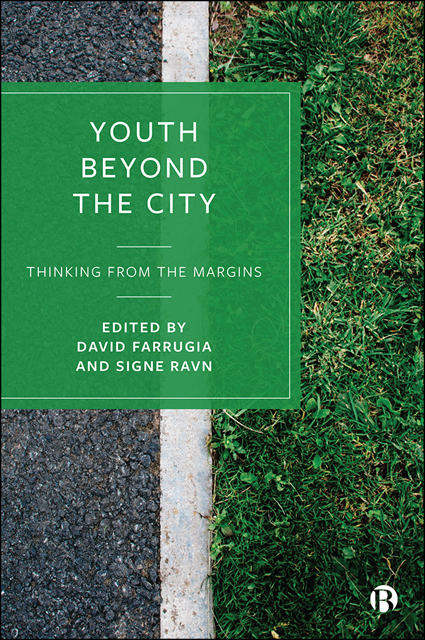Book contents
- Frontmatter
- Contents
- List of Figures and Tables
- Notes on Contributors
- Introduction: Thinking from the Margins
- Part I Inequalities: Education and Aspiration on the Margins
- Part II Materialities: Spatiality and Sensory Embodiment
- Part III Identities: Mobility, Rootedness and Belonging
- Part IV Temporalities: Historicizing Space and Place
- Index
12 - At the Margins: The Persistent Inequalities of Youth, Place and Class
Published online by Cambridge University Press: 13 October 2022
- Frontmatter
- Contents
- List of Figures and Tables
- Notes on Contributors
- Introduction: Thinking from the Margins
- Part I Inequalities: Education and Aspiration on the Margins
- Part II Materialities: Spatiality and Sensory Embodiment
- Part III Identities: Mobility, Rootedness and Belonging
- Part IV Temporalities: Historicizing Space and Place
- Index
Summary
Introduction
If one of the main roles of Youth Studies is to throw light on continuity and change in the life-worlds of young people and, as a consequence, in society at large (MacDonald, 2011), there is obvious value in being able to observe these processes over a longer period than normally provided for by one, individual study. In this chapter I offer some new analysis and reflection – in respect of youth and place – drawing on studies I have done over 40 years in rural and/ or marginalized localities in the North of England. Even this short historical perspective suggests a number of conclusions about the significance of place for young people and how this has changed, or not. It also helps us reflect a little on what scholars can learn from long-term engagement with questions like these.
The chapter draws on three examples, beginning with my doctorate from the 1980s (MacDonald, 1988). This was about youth unemployment in rural areas. At that time in the UK, very little had been written about rural youth. The PhD showed how place made immediate ‘the structure of economic opportunities’ for young people, how it generated different degrees of attachment, and how it contoured local class identities that tell you ‘who you are’ and ‘what you can do’. In short, place conditioned the choices and opportunities of transitions to adulthood. This argument is developed in the two subsequent examples. The Teesside Studies of Youth Transitions and Social Exclusion (conducted from the early 1990s onwards) uncovered how, even in deeply deindustrialized towns that carry the heavy weight of negative labelling and social stigma, there can exist positive, class-based cultures of inclusion. The final example is current and stays with Teesside. It shifts attention to how inequalities of place interact with the inequalities of a more democratic but still stratified higher education system. The focus here is on the ‘non-traditional’, ‘first generation’ university students of ‘the missing middle’. Made geographically immobile by multiple cultural, social and material influences, they are limited to their local, small-town university and its weak graduate labour market. For them, the financial, emotional and psychic costs of getting a degree are high while the returns and chances of upward social mobility appear to be low.
- Type
- Chapter
- Information
- Youth beyond the CityThinking from the Margins, pp. 235 - 255Publisher: Bristol University PressPrint publication year: 2022



